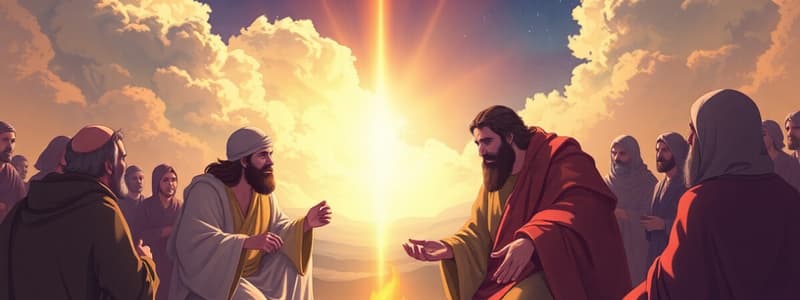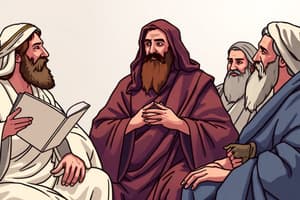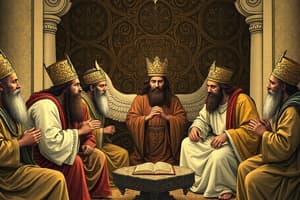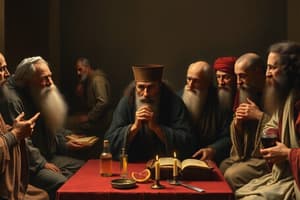Podcast
Questions and Answers
What was Jesus's dual objective during his ministry?
What was Jesus's dual objective during his ministry?
- To focus solely on personal spiritual enlightenment, disregarding societal impact.
- To accumulate wealth and build magnificent temples.
- To establish a new political order and overthrow the Roman Empire.
- To announce God's kingdom, invite people, and cultivate a group to continue his mission. (correct)
Why did Jesus choose twelve apostles?
Why did Jesus choose twelve apostles?
- Twelve was his lucky number.
- To represent the twelve tribes of Israel, symbolizing a renewed covenant. (correct)
- To mirror the twelve signs of the Zodiac.
- The number twelve was a random selection.
Before selecting the twelve apostles, what action did Jesus take?
Before selecting the twelve apostles, what action did Jesus take?
- He spent a night in prayer. (correct)
- He held a public vote.
- He consulted with the local religious leaders.
- He fasted for forty days in the desert.
What detail is explicitly mentioned about the apostles' backgrounds before their calling?
What detail is explicitly mentioned about the apostles' backgrounds before their calling?
What motivated Jesus's compassion for those who came to hear and see him?
What motivated Jesus's compassion for those who came to hear and see him?
What was the core point of contention between Jesus and the Pharisees regarding the Sabbath, as illustrated in the passage from Exodus?
What was the core point of contention between Jesus and the Pharisees regarding the Sabbath, as illustrated in the passage from Exodus?
How did Jesus defend his actions and challenge the Pharisees' interpretation of the Sabbath?
How did Jesus defend his actions and challenge the Pharisees' interpretation of the Sabbath?
According to content, what was the general attitude of the common people toward the Pharisees during the time of Jesus?
According to content, what was the general attitude of the common people toward the Pharisees during the time of Jesus?
What was the Pharisees' initial reaction to Jesus healing the man with the withered hand on the Sabbath?
What was the Pharisees' initial reaction to Jesus healing the man with the withered hand on the Sabbath?
What role did the scribes play in relation to the Pharisees and Jewish law?
What role did the scribes play in relation to the Pharisees and Jewish law?
Why did the Pharisees initially refuse to believe that the man born blind had been healed?
Why did the Pharisees initially refuse to believe that the man born blind had been healed?
What does Jesus imply when he says, 'For judgment I came into this world, that those who do not see may see, and that those who see may become blind?'
What does Jesus imply when he says, 'For judgment I came into this world, that those who do not see may see, and that those who see may become blind?'
What is the most likely reason the Pharisees threw the healed man out?
What is the most likely reason the Pharisees threw the healed man out?
In the context of this passage, what does it mean to be 'blind'?
In the context of this passage, what does it mean to be 'blind'?
What is the significance of Jesus asking the healed man, 'Do you believe in the Son of man?' after the Pharisees cast him out?
What is the significance of Jesus asking the healed man, 'Do you believe in the Son of man?' after the Pharisees cast him out?
Flashcards
Jesus's Main Purposes
Jesus's Main Purposes
To announce the arrival of God's kingdom and gather followers.
Apostles
Apostles
The group of people selected to carry on Jesus's work after his death.
Jesus's compassion
Jesus's compassion
A feeling of deep sympathy and sorrow for someone who is suffering misfortune.
The Harvest Analogy
The Harvest Analogy
There are many opportunities, but not enough people to help.
Signup and view all the flashcards
The Twelve Apostles
The Twelve Apostles
Peter, Andrew, James, John, Philip, Bartholomew, Thomas, Matthew, Thaddaeus, James, Simon, Judas
Signup and view all the flashcards
Harvesting on the Sabbath
Harvesting on the Sabbath
An action considered work, and therefore prohibited on the Sabbath according to some interpretations of Jewish law.
Signup and view all the flashcards
Jesus & the Sabbath
Jesus & the Sabbath
Jesus claimed authority over it.
Signup and view all the flashcards
Who were the Pharisees?
Who were the Pharisees?
A Jewish group known for strict adherence to religious law and tradition.
Signup and view all the flashcards
Pharisees: Foes or Friends?
Pharisees: Foes or Friends?
Not all Pharisees were enemies of Jesus; some were good people, even admirers.
Signup and view all the flashcards
Who were the scribes?
Who were the scribes?
Learned scholars of Jewish law, often mentioned alongside the Pharisees.
Signup and view all the flashcards
Why did the Pharisees criticize Jesus?
Why did the Pharisees criticize Jesus?
The Pharisees questioned the healing because it broke Sabbath rules.
Signup and view all the flashcards
What does 'blindness' mean in this context?
What does 'blindness' mean in this context?
Jesus explains that He came to bring sight (understanding) to those who are spiritually blind and reveal the blindness of those who think they see (the Pharisees).
Signup and view all the flashcards
How does Jesus show compassion?
How does Jesus show compassion?
Meeting, questioning and healing the man.
Signup and view all the flashcards
What did the healed man do when meeting Jesus?
What did the healed man do when meeting Jesus?
Faith and worship.
Signup and view all the flashcardsStudy Notes
Apostles and Opponents
- Jesus had two main objectives during his public ministry: announcing the coming kingdom of God and training a group to continue his mission after his death.
- Jesus traveled through Galilee, preaching, healing, and casting out demons, expressing compassion for those who sought to hear and see him.
- Jesus told his followers that the harvest of souls was plentiful, but the laborers were few.
- After a night in prayer, Jesus chose twelve disciples to be his apostles ("messengers") and pillars of the faith.
- The selection of twelve men mirrored the twelve tribes of Israel symbolizing a renewed covenant.
- The twelve apostles were Simon (Peter), Andrew, James (son of Zebedee), John, Philip, Bartholomew, Thomas, Matthew, Thaddaeus, James (son of Alphaeus), Simon the Zealot, and Judas Iscariot.
Commissioning the Twelve
- The apostles were instructed to proclaim the coming Kingdom to the lost sheep of the house of Israel.
- They were told not to take money for preaching, but to rely on the generosity of those they preached to.
- The apostles were to expect hostility and rejection, and to trust entirely in God.
- From then on, they would share: "Do not think that I have come to bring peace on earth; I have not come to bring peace, but a sword."
- Jesus came as the penetrating two-edged sword of God’s word, and not as a military leader as many expected.
The Death of the Baptist
- The apostles began their mission shortly before two of John the Baptist's disciples arrived.
- John, imprisoned by Herod Antipas, sent his disciples to ask Jesus if he was the one they were waiting for.
- Jesus responded by telling them to report what they saw and heard: the blind receiving sight, the lame walking, lepers cleansed, the deaf hearing, the dead raised, and the poor hearing good news.
- Jesus added, "Blessed is he who takes no offense at me."
- John sent his disciples to Jesus perhaps due to anticipating his own death, wishing to shift his followers' faith to Jesus.
- Others speculate it was due to feeling a need for reassurance that his life's work as herald of the Messiah had been fulfilled.
- Jesus spoke of John the Baptist with deep appreciation, that among those born of women there has arisen no one greater than John the Baptist; yet he who is least in the kingdom of heaven is greater than he.
- Jesus notes "if you are willing to accept it, he is Elijah" in reference to John.
The Battle Lines Are Drawn
- People brought to Jesus a mute, blind man possessed by an evil spirit.
- Jesus healed the man, enabling him to speak and see, leading onlookers to ask if Jesus was the Son of David.
- Pharisees sneered that Jesus cast out demons by Beelzebul, the prince of demons.
- Jesus stated calmly that he cast out demons by the Spirit of God, and accusing him otherwise was blasphemy.
- He warned that speaking against the Holy Spirit would not be forgiven in this age or the age to come.
- Jesus as agent of Beelzebul, defined Pharisees as blasphemers of the Holy Spirit, marking a division.
- According to John's Gospel, unlike the Synoptic Gospels, Jesus stayed in Galilee without visiting Jerusalem and made multiple visits to the Holy City.
Clashes With Authorities
- Jesus visited Jerusalem three times yearly for the pilgrimage feasts: Passover, the Feast of Weeks, and the Feast of Tabernacles.
- Jesus used these visits to proclaim the Kingdom to pilgrims, engage religious members of Jerusalem in discussion and debate.
- One day, during the Feast of Tabernacles Jesus moved listeners to question, "Is not this the man whom they seek to kill?"
- Jesus stated "Before Abraham was, I am" which was the name Yahweh gave himself in the Old Testament.
- Jesus's accusers seized stones to throw at him in the Temple under the justification of blasphemy.
- In the street, there was a man blind from birth begging.
- Sighting the beggar, Jesus's disciples had asked whose fault it was he was born blind "did he bring this on himself or was it his parents' fault?"
- Jesus responded that it was not due to this man’s sins, but his parents' fault.
- Jesus spat on the ground, made paste, anointed the man's eyes, and instructed him to wash in the pool of Siloam located in the southern district of the city
- The Pharisees questioned the healed man due to the cure occurring on a Sabbath, and predictably announced, "This man is not from God, for he does not keep the sabbath."
- Pharisees asked the man born blind what he thought of Jesus and the man answered "He is a prophet"
Additional Clashes
- Unable to accept the miracle, the Pharisees interrogated the parents of the once-blind man.
- The parents feared expulsion from the synagogue if they spoke the truth and simply stated that their son was of age and should be asked about the situation.
- The Pharisees then hauled the formerly blind man before them to ask him a second time what Jesus had done.
- The man responded "I have told you already, why do you want to hear it again? Do you want to become his disciples?"
Abuse from the Pharisees
- Pharisees began to shout abuse at the man who stood his ground.
- Pharisees demanded scornfully of Jesus: "You were born in utter sin, and would you teach us?"
- The Pharisees threw the man out.
- Then Jesus sought the man out and asked, "Do you believe in the Son of man?"
- The blind man asked Jesus "Who is he, sir, that I may believe in him?”
- Jesus responded "It is he who speaks to you."
- "Lord, I believe" said the blind man and worshiped him.
- Some Pharisees took offense at this
- As Jesus talked to his companions, he said, "For judgment I came into this world, that those who do not see may see, and that those who see may become blind."
- The Pharisees asked angrily of Jesus "Are we also blind?"
- The blind man worshipped him.
- Jesus responded, "If you were blind, you would have no guilt; but now that you say, 'We see,' your guilt remains."
Disagreement With Pharisaic Doctrine
- In Exodus, harvesting on the Sabbath was forbidden.
- The disciples were doing what the Pharisees did not deem lawful which gave the Pharisees cause of disagreement.
- Jesus disputed their interpretation of scripture
- Jesus infuriated the Pharisees with the claim that "The Son of man is lord of the sabbath."
- The argument continued inside the synagogue with a man with a withered hand.
- Jesus asked the Pharisees, "Is it lawful to heal on the sabbath?"
- Before the Pharisees could respond, Jesus declared, "It is lawful to do good on the sabbath."
- Jesus instructed the man to stretch out his hand, and it was suddenly strong and whole.
- The Pharisees stormed out of the synagogue and began arguing on how to be rid of Jesus.
Nuances of Opposition from the Pharisees
- The enemies of Jesus will play a significant role in the rest of his story.
- Not all Pharisees were enemies of Jesus because many were decent people,
- Nicodemus, a Pharisee, was an honest inquirer who approached Jesus one night in Jerusalem.
- Other Pharisees had passed word to Jesus that Herod Antipas was looking to kill him as he had killed John the Baptist.
- While the Pharisees imposed very strict adherence to Jewish doctrine and practice, they should not be simply blamed.
- Pharisees were a force for reform and renewal, widely admired by the common people of Judaism.
- Some Pharisees had seen his disciples plucking heads of ripe grain in the fields and eating them.
- Many of the scribes, learned scholars of the Jewish law, are frequently mentioned in the Gospels.
- The Pharisees did not approve of this harvesting on the Sabbath.
- John was a prophet on the model of Elijah and was a man was sent by God, many could see for themselves, here was the Messiah — Jesus.
- Because they resembled foolish children who refused to dance or mourn, they would not believe Jesus.
Jesus' Anger Towards Galilee
- Just as John ate neither nor drank and the public called him a demon, Jesus was eating and drinking, and the public called him a glutton and a drunkard, a friend of tax collectors and sinners.
- His disappointment mingled with righteous anger as he called out the towns of Galilee where he had preached so often.
- Jesus exclaims that the towns of Chorazin, Bethsaida, and Capernaum will be more tolerable on the day of judgment than for them.
- Shortly thereafter, Herod Antipas had John the Baptist executed after his illegitimate wife Herodias danced for his guests.
- Wishing he could impress his guests, Herod would have gifted her anything she asked for.
- Herod hesitated, seeming interested in hearing John speak, but afraid of looking foolish to his guests if he reneged on his rash promise.
- The danger from the hostility of his enemies was becoming apparent as they began converging on Jesus as well.
Studying That Suits You
Use AI to generate personalized quizzes and flashcards to suit your learning preferences.




